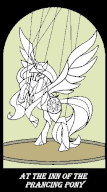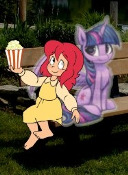Luna's Reviews: Doctor Who: Survival, Part One--The Problem with Children · 6:08am Sep 16th, 2014
I watched the entirely of the so-called “Classic” series of Doctor Who one day (1), and decided to jot down some notes on one of the serials. Not my favorite serial, or my least favorite. Not the fan favorite or least favorite, either. No, I thought I’d tackle the last episode, Survival, as a way of addressing my thoughts on the entire series. Hopefully, this will not be a higher step than I can climb (2).
Survival aired on the BBC from November 22, 1989 to December 6, 1989. At the time of the final episode’s airing, there was no official announcement of the series’ cancellation (the BBC maintained for years that the series was merely “on hiatus”), and it took a year before the fans knew beyond all doubt. Sixteen years would pass before the revival of the series, punctuated by the moderately successful TV movie in 1996 that nevertheless failed to lead to a new series. This period has gone down in fan history as the “Wilderness Years”.
The serial begins in the London suburb of Perivale. A bored young man is washing the family car. He looks up, sees something terrifying, and starts to run. His pursuer catches him and in a flash, he is gone. Too late, his nagging mother emerges from the house and half-heartedly starts to search for him. Meanwhile our leads, the mysterious Doctor and his companion Ace, arrive in the TARDIS. (The Doctor in this serial was the seventh incarnation of the character, and was played by Sylvester McCoy. Ace was played by Sophie Aldred.) Ace, as always, calls the Doctor “Professor”—she’s got a thing against authority figures and this is her way of expressing it; the Doctor has displayed a similar distrust ever since the series was launched in 1963. On arriving in present-day Perivale, Ace expresses her wish to catch up on what her friends had been doing in the time since she left Earth. Despite this fact, she’s disappointed to be back in this town.
DOCTOR
So what’s so terrible about Perivale?ACE
Nothing ever happens here.
There were only five million people watching the first episode of Survival. That’s less than a sixth of the available viewing audience in the United Kingdom. By contrast, the single most-watched episode of the Classic series, the final part of the Douglas Adams-penned City of Death in 1979, had 16.1 million viewers. The last time that ten million people watched an episode of Doctor Who was in 1982. Doctor Who had been in decline for a long time.
The Doctor and Ace climb a hill where her old friends used to congregate. Nobody’s there. A bit of searching finds the few young men left in Perivale at the Youth Center. There an instructor in battle fatigues named Sergeant Paterson teaches them the art of self-defense.
STUART
I’d already beat him, Sarge!PATERSON
(JABBING STUART with each sentence)
Oh, you think I'm too hard, do you?
Pushing you too hard, am I? Have you ever
heard of survival of the fittest, son, eh?
Have you ever heard of that? Life's not a
game, son. I mean, I'm teaching you the art
of survival. I'm teaching you to fight back.
What happens when life starts pushing you
around, son, eh? What're you going to
do then?STUART has finally had enough, and SWINGS a fist at PATERSON, who easily GRABS it.
PATERSON
That’s better.
The series was cancelled for low ratings. That, and the BBC administration was not sympathetic towards a science fiction series aimed at families. The reason for the decline in ratings since the heydays of the Third through Fifth Doctors is more difficult to pin down. The executive producer at the time, John Nathan Turner, pointed to the “too silly” Graham Williams era that had proceeded him, promising to make the series more serious and more oriented towards the needs of the fans.
Perhaps this was the problem. Turner, unlike previous executive producers, had no writing experience, and so left creative control of the series with an unworthy script editor. Eric Saward seemed to hold the pacifistic Fifth Doctor in contempt, sidelining him in serial after serial while glorifying the sort of mindless violence that the young male demographic craved. Five was then succeeded by Six, who in nearly his first act in his introductory serial assaulted his young female companion while under a psychotic fit. After the BBC induced a year-long hiatus to re-tool the series, it came back with a season long arc that was a thinly-disguised attack upon the network and a substantial portion of its viewers. Finally Saward quit, and was replaced by the completely inexperienced Andrew Cartmel, who had grand goals for the series, but mostly had to fight to get something comprehensible out within the 25 minute episode limit. The new Seventh Doctor was condemned by the fans, first for being too frivolous, and then for being too Machiavellian.
Ah, the fans. Here we truly get to the crux of the problem. The highest rated episode between 1982 and cancellation was Attack of the Cybermen Part One in 1985, an episode tailor-made for fans. The villains were from the distant past of the series, with little done to introduce them to any viewers unfortunate enough not to have memorized the details of episodes that aired a full decade earlier. Large portions of the script of Attack of the Cybermen are devoted to continuity references. There’s posturing and plenty of machismo. In other words, Doctor Who in this period was aimed at nerdy teenage males, and practically no one else. This unstated feeling, that the show was for dedicated fans, and that new members need not apply, ultimately doomed the series.
For, you see, there’s nothing more fulfilling to a young male fan, than declaring that their favorite series has “betrayed” them, and deserves to be abandoned. This is the same time of life when this demographic group is rebelling against their parents, their teachers, and everyone else who told them what to do and think in their earlier years. The result of this for Doctor Who is that the series was trapped in an ever diminishing fanbase. More and more fans would find something that had betrayed them, and leave, while the series actively discouraged new fans from joining, because to be a true fan, you needed to know an ever increasing amount of trivia about Daleks, Cybermen, the Master...
I’ll get back to the Master.
Paterson doesn’t know where all the young men and women have gone. “Missing,” is all he says. He clearly doesn’t care.
The Doctor meanwhile has noticed a cat that has been following him around. (A badly-done animatronic cat, but that’s what a TV production company is stuck with when they get the bright idea to try to make a cat do anything specified in a script.) He goes to a pet store to buy some food, and stumbles into the middle of a joke being told by the shopkeeper to his assistant. I’m sure you’ve heard it before: Two men out camping hear a lion coming their way. The first man responds by putting on his running shoes.
LEN, the shopkeeper
And the other bloke turns to him and says,
what are you doing? You can't outrun a lion.
The bloke turns to him and says,
I don't have to outrun the lion.LEN waits for HARVEY to laugh.
HARVEY, the assistant
Don’t get it.DOCTOR
He doesn't have to outrun the lion, only his
friend. Then the lion catches up with his
friend and eats him. The strong survive, the
weak are killed. The law of the jungle.HARVEY
Oh yeah. Very clever.DOCTOR
Yes, very clever, if you don’t mind losing
your friend. But what happens when the next
lion shows up?
Ace finally finds one of her friends, collecting donations for hunt saboteurs.
ACE
Ange!ANGE
Oh, hi, Ace. I thought you were dead.ACE
What?ANGE
That's what they said. Either you were dead,
or you'd gone to Birmingham.
Children are a nuisance. That’s the general opinion I’ve gotten from the adults in my acquaintance who aren’t parents. They don’t get your jokes, they have nothing you want, and they have a nasty habit of seeing through the harmless lies that are necessary for adult society to function properly. As such, they go into the same category as those little yapping dogs that won’t shut up.
Directed by a man in the shadows with cat-like eyes, the black cat who’s been lurking around this entire episode so far turns its attention towards Stuart, the hapless teenager from the Youth Center. Once again, something big stalks its victim, and removes it from reality with a flash of bright light.
The next street over, the Doctor opens the tins of cat food he bought and sets out the food, then hides behind a fence and watches.
Ace sits down on some playground equipment. She looks up to see a humanoid cheetah riding a horse. She is in awe. The cheetah gives chase, but Ace doesn’t run into the open like the other dumb victims. Instead, she tries to use the playground equipment to keep her pursuer away from her. It takes a while longer, but eventually the cheetah reaches its victim, and like the others, Ace vanishes, right before the Doctor arrives on the scene.
Nightmare Moon was evil. I think this goes without saying. I define “evil” to mean the willingness to inflict pain upon another for any reason whatsoever. In my case, the Nightmare tried to bring about the death of all photosynthetic-dependent life on Equestria, in order to get revenge on everybody who liked my sister better than me.
For allowing the Nightmare to do these things, for not regretting its actions until long after we were both imprisoned in the Moon, I was evil. I will spend the next several centuries atoning for my evil acts, both committed and attempted.
My definition of “evil” is not very popular with others. On Earth, I have been informed that force is often necessary to stop suffering, that the strong prey upon the weak, and that some individuals only understand “the language of pain”. I persist in my definition. Maybe it only makes sense in Equestria.
There is one aspect of my definition of “evil” that I should point out. According to it, all children are evil. I don’t have a problem with this, although I have known individuals who have gone through any number of mental gymnastics in order to come up with definitions of “good” and “evil” that leave so-called innocent children in the “good” category.
This is clearly ridiculous. Children are savage little animals. They pursue whatever they want. The only pain they recognize is their own. Their minds have to be forcibly reshaped by adult society into embracing a foreign way of thinking. A way of thinking known as “civilization”.
The Nightmare was a child.
Ace and the cheetah on horseback appear on an alien planet. This is where the teenagers have been taken. Ace discovers from the others that there are more mounted cheetahs, and that they hunt the humans for sport.
Back on Earth, the Doctor is about to catch the black cat that appears to be connected with the cheetahs, when he is apprehended by Sergeant Paterson. There have been complaints about the Doctor’s behavior. The disappearance of teenage troublemakers is of no concern to the childless adults of Perivale, but a man crawling around on his hands and knees is clearly a menace to society. The Doctor and Paterson stumble upon the cat, and are transported to the cheetah’s planet. Here it becomes clear that the cat controls the portals that the cheetah people use to hunt.
(Yes, I know—this is all getting a bit silly. Bear with me.)
The two adults arrive in the camp of the cheetah people. From a tent emerges their leader...the Master. End episode one. Hey, at least the serial title this time wasn’t Survival of the Master.
Footnotes by McPoodle:
1) This statement is literally true. Princess Luna was given access to a closed electronics store for two days. She paid for the electricity. Fifteen monitors with DVD players were arranged around her. She started DVDs in each machine at one minute intervals, and then began watching the entire series on fifteen screens simultaneously, changing out DVDs (or audio CDs for the missing episodes) as necessary—each machine played through one, two or three seasons, depending on how many episodes were in each season. The whole time, her eyes were closed, and her mane floated around her head like she was underwater. She wouldn’t tell me exactly how she watched all of those screens with her eyes closed, but I suspect that the rumor that she can see out of all the “stars” in her mane is in fact correct. Anyway, that part took twenty-four hours. After that, she spent six hours in a trance, which she later told me she used to cut up and re-arrange the memories of that viewing so that she only focused on one monitor and accompanying soundtrack at a time, thereby converting twenty-four hours of compressed memories into the virtual equivalent of twelve and a half days’ worth of television marathoning.
And then, after a few weeks of considering and coming up with her own opinions, she compared them with the collected wisdom of the entire internet, because she has the power to go online with her mind.
That pony scares me sometimes.
2) This is an Equine expression equivalent to “biting off more than you can chew” in English.






Um, it was only 16 years. Unless you don't count the Ninth, Tenth, and Eleventh doctors, and think it didn't really revive until Twelve.
On a note almost completely unrelated to this blog, I have only just realized that I forgot to favorite At the Inn of the Prancing Pony. It is on my Read Later list. I will work to rectify this horrendous oversight.
I agree with your definition of evil, your majesty. Though I am of the opinion that a being can do evil things without being wholly evil, and in that ideal that an evil being may become good. I believe this follows your teachings of atonement. Our first great task in life is to overcome the evil that drives us to greed, dishonesty, cruelty, betrayal, and sinister behavior. Regardless, I am pleased to continue assisting you in your current writings.
2459073
Do you know how hard it is to count on hooves?
Just kidding--fixed.
2460729
Yes, absolutely. To believe as I do that all children commit and think enough evil before the age of ten to deserve the death penalty if they were responsible adults, and yet think that evil can never be forgiven, is an act of sheer madness. (Lunacy? No! Bad McPoodle.)
And I really do need to find time to get back to our writing. As you can see, both McPoodle and myself were inspired by the new season on BBC America.
2461064 I await your correspondence with baited breath and readied keyboard. Really, I feel I must say it for the hundredth time, thank you for giving me this chance, your majesty.